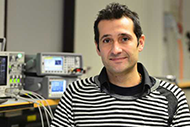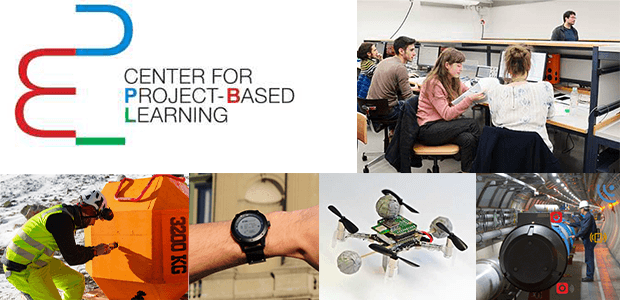Center for Project-Based Learning celebrates first anniversary
A year ago, the Center for Project-Based Learning D-ITET (PBL) opened its doors. Head Dr. Michele Magno talks about the achievements in this special year and about his plans for the future. The Center is currently looking for more students and is open for new collaborations inside and outside D-ITET.
Michele, when we interviewed you in January 2020, you had quite a few exciting projects and ideas in mind. But then Covid-19 came… So how was the first year of the Center?

It was different than expected! The plan changed a bit due to Covid-19. The good thing was that we had more time to organize the flagship projects and to give more practical training to the students. In particular, we were able to introduce 11 new P&S (Projects and Seminars) courses in collaboration with different professors. In these courses, we started with 7 to 8 mixed teaching and lab activities and we ended with practical projects of 5 to 6 weeks, allowing Bachelor’s students to learn using hands-on activities. Those skills will be very useful for the 2021 Bachelor’s thesis and other projects, especially the flagship projects.
All in all in 2020, PBL supervised, sometimes together with other professors, over 50 students for group/semester/Master's projects, and over 200 Bachelor's students were enrolled in the P&S courses offered.
“A member of our Advisory Board, I think it was Sebastian Kozerke, said PBL “started like a rocket, but now it is time to make it fly even higher”. I like this sentence! ”Dr. Michele Magno, Head of the Center for Project-Based Learning D-ITET
How many people are now employed at PBL?
Currently, we have three post-doctoral , one administrative assistant, a couple of co-funded doctoral students - and of course myself. I also need to thank all the professors helping the teaching activities with their own doctoral students or senior staff. Due to funding from external projects, I will be able to employ two more people, one on embedded systems and one on power electronics.
How about the two flagship projects you had planned? Did you have to cancel them?
Covid-19 also affected the flagship projects originally planned, so we decided to put the planned «ETH-ITET Challenge» on hold and to start the flagship with several smaller projects rather than one big. We developed a Covid-19 smart watch that was in the ETH news this month as well as a bio-impedance wireless sensor node that reached the semifinal of the CISCO innovation Challenge. In another project Master’s students are currently working in collaboration with UZH and the Lausanne University Hospital to develop smart wearable devices. These projects will contribute to the flagship project that is now planned in spring/fall 2021. Quite a few Bachelor’s students have already registered for it for their Bachelor’s thesis.

What are your most important projects at the moment?
The Center is proposing a variety of projects in different fields with professors at D-ITET and other departments at ETH. It is hard for me to choose the most important as I like all of them!
Students seem to be very interested in our projects with FPGAs and smart sensors as well as machine learning on low power processors and novel sensors. A lof of activities involve drones with intelligence sensor fusion and ultra-wideband and combine energy harvesting with wireless communication.
Another major project is the “Smart Patch” in collaboration with IBM research and various hospitals. The main goal here is to design a wearable intelligent patch that is able to get data from the human body through sensors and perform signal processing. In this project we are investigating the use of novel radar technology that Infineon provides us. Finally, I believe the new collaboration with CERN in Geneve and the SLF (Swiss Avalanche and Snow Institute) in Davos to design and develop battery-free and wireless smart sensors will have a huge impact.
Will there be student challenges or other competitions?
Yes! D-ITET and PBL are also officially supporting some very cool student challenges, in particular, "SwissLoop", "Not-a-Boring Challenge", and the "ARIS project". These offer good opportunities for the students to work in a large group with students from all over ETH, and I am very happy that PBL and D-ITET are official partners of those projects
Finally, I would like to highlight two challenges we are launching next semester in collaboration with companies: In the "ARM Challenge" students will develop ARM-based windows applications and they can win a unique Microsoft Surface with an ARM processor. The second one is the "STM Microcontroller Challenge" on industrial smart sensors, for which there will also be an award.
Who are you already collaborating with at D-ITET?
Apart from projects with Prof. Luca Benini, we are proposing projects involving FPGA for quantum computing together with Prof. Lukas Novotny. And in collaboration with Prof. Christian Franck, students develop smart sensors with machine learning to monitor high power plants. On the machine learning side with Prof. Giacomo Indiveri we are very active with a project about Spiking Neural Networks. With Prof. Richard Hahnloser we are developing a batteryless Bluetooth sensor node. And soon I will disclose some interesting projects with Prof. Johann Kolar, Prof. Florian Doerfler, Prof. John Lygeros, Prof. Gabriela Hug, and many others.
Are you looking for more collaborations within the department?
Yes, I am! The collaborations have just started, and I believe I will need the whole period of spring 2021 to complete my round of talking with all professors at D-ITET.
Were you still able, as planned, to start larger and inter-departmental projects?
I am working on it. I started to talk with a lot of professors on organizing inter-departmental projects. This is still one main goal of the center, but realistically we will see something come up in 2022, but the earlier the better.
The list of industrial projects on the PBL website looks quite impressive! How did you manage to set up all these collaborations?
Actually, I didn’t put all of them! I simply used all my previous communication channels and persisted. So, today we have collaborations with major electronics and industrial companies. Two renowned companies provide us novel sensors which ETH students are the only ones in the world to use! Another global player is giving access to their Neuromorphic processor. Very few universities in the world have access to these latest technologies. I believe the PBL website and the fact that we are quite a unique center, based at ETH Zurich, attracted also a lot of companies. Let’s hope that Covid-19 will not slow us down in the next months.
What are your goals for 2021?
A member of our Advisory Board, I think it was Sebastian Kozerke, said PBL “started like a rocket, but now it is time to make it fly even higher”. I like this sentence! So the first goal is a consolidation of all the activities we started, improving the quality more than the quantity. Moreover, as the success of the Covid-19 smart watch demonstrated, I would like to fully start the smart patch flagship and to have it covered by the media. Finally, I would like to put the basis of the next flagship project with the collaboration of D-ITET professors.
What are your personal insights after this special Corona year?
Corona or not - we have excellent students that want to learn and challenge themselves in cool projects. So we need to continue to give them this opportunity.